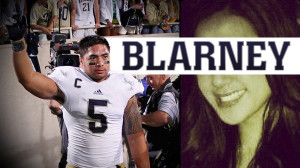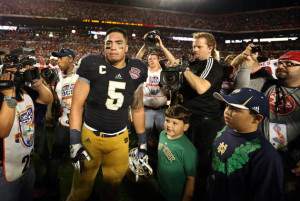Remarkably, Manti Te’o’s improbable tale about his imaginary girlfriend dying of cancer on the same day his grandmother died last September is competing for media coverage with Lance Armstrong’s belated confession about taking performance-enhancing drugs (PEDS).
Te’o is the All-American linebacker from Notre Dame whose tale of personal tragedy became even more of an inspiration for the Fighting Irish last season than the proverbial “win one for the Gipper” ever was.
Specifically, after tebowing about his professed twin griefs for all the world to see, he led the Irish on an impressive winning streak that ended only last week in a punitive loss to Alabama in the BCS national championship.
 I use the word “punitive” advisedly; because on Wednesday the sports website Deadspin.com exposed every word Te’o ever said about his girlfriend – from his heart-rending recollections about the hours he spent on the phone nursing her to sleep after her chemo sessions to his description of the intimate connections they had – as all “blarney.”
I use the word “punitive” advisedly; because on Wednesday the sports website Deadspin.com exposed every word Te’o ever said about his girlfriend – from his heart-rending recollections about the hours he spent on the phone nursing her to sleep after her chemo sessions to his description of the intimate connections they had – as all “blarney.”
Te’o claims that he was a victim of what he calls a “sick joke,” insisting that he had no idea the woman he fell in love with online and over the phone does not exist.
In other words, despite what he claims was the undying love he developed for her and the way he comforted her while she was dying of leukemia, Te’o wants the world to believe that he never felt the irresistible desire or emotional need to lay eyes, let alone other body parts, on her (for two and a half years!?). Which has to mean that he’s either gay or emotionally bankrupt … or both:
We maintained what I thought to be an authentic relationship by communicating frequently online and on the phone, and I grew to care deeply about her.
(Associated Press, January 17, 2013)
But trust me folks, it strains credulity to think that Te’o was not in on the “joke.” He insists, for example, that he had almost daily phone conversations with his imaginary girlfriend. Yet no girl or guy has come forward to say that he or she was the person on the other line playing him for a fool. And what a fool he had to be if he could not tell that, all the while, he was just speaking either to one of his (male) friends or to a number of different people all pretending to be her.
 Which begs the question. Why perpetrate such a hoax? I suspect what I alluded to above probably offers the best explanation; namely, that he saw how inspiring his story was—not just to his teammates, but to the entire world of sports once his team kept winning games. He probably even began having delusions about winning the Heisman Trophy: think Munchausen by proxy on steroids.
Which begs the question. Why perpetrate such a hoax? I suspect what I alluded to above probably offers the best explanation; namely, that he saw how inspiring his story was—not just to his teammates, but to the entire world of sports once his team kept winning games. He probably even began having delusions about winning the Heisman Trophy: think Munchausen by proxy on steroids.
This smacks of nothing more than a private hoax that got completely out of control – thanks in no small part to a patently lazy, gullible media. But neither Te’o nor anyone else who was in on it could have fathomed that it would become a talisman that fueled his team to an improbable streak of victories the way PEDs fueled Lance to his now inglorious streak.
This, I believe, is the real story behind this so-called joke. Except that the joker is Te’o and the joke’s on us. Which compels me to stress that far from blaming and shaming this obviously troubled football player, blame and shame should be heaped on officials at Notre Dame and newsroom editors all over the country who not only bought Te’o’s blarney hook, line and sinker, but did far more than he did to propagate it.
Having said all that, I am mindful that, like Kate Middleton’s nurse, Te’o might not be able to stand the public ridicule that is now coming at him every which way but loose. The difference of course is that, all indications are, he brought this on himself. Nonetheless, whatever fallout or development may come, I will not be dignifying this catfish story with any further comment.